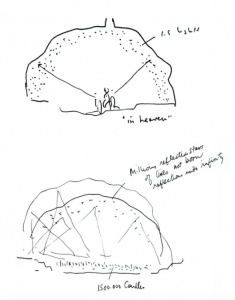“Echoes in the bone refer to not only to a history of forgetting but to a history of empowering the living through the performance of memory.” —Joseph Roach, “Echoes in the Bone”
I felt my most profound stirring at the Yad Vashem Holocaust Museum in Jerusalem when I entered the Children’s Memorial. Eyes squinting from the sun soon entered a space of darkness. This darkness was interrupted by thousands of lights created from the mirrored reflection of one memorial candle. Surrounding me were the utterances of children’s names in continuous succession. Upon exiting the exhibit, the mid-day dry sun overwhelmed me as I realized the tears on my face.
According to the Safdie Architects, the architectural group who designed the memorial, “the challenge of Yad Vashem, the Children’s Memorial and the historic museum, was to create the setting for a horrific narrative, yet culminate in an uplifting celebration of renewal.” Jerusalem— a holy space steeped in history and contestation—is a liminal space in itself that provides the context for Yad Vashem, a space that embodies both the horrific and the uplifting. Yad Vashem provides a space to cultivate and perform memory through symbolic but evocative means, therefore empowering the living who still feel and reel from the disappearance and elimination of both familial and religious ancestors.

At the same time that memory is performed, it is also erased. Early this month, a bill passed through the Polish senate that would make it a crime for anyone to accuse Poland of complicity during the Holocaust. For Professor Anita Prazmowska, the law represents a “blunt instrument” against memory. It’s the use of history—or the denial of history—as a tool in which to assert a nationalist agenda. By doing so, the Polish government is extending a policy of forgetting.
Yad Vashem, as a major cultural entity in the Jewish diaspora, extends its influence beyond the contested borders of Israel/Palestine/West Bank/Judea & Samaria. As an arbiter of diasporic memory, Yad Vashem stated that the new law Polish would seek to “obscure the historical truth regarding the aide the Germans received from the local Polish community during the Holocaust.” In this way—like the Polish government, but in a different way—Yad Vashem uses its power and influence over memory to counter-assert a history, for a different agenda.

What this development, this debate within Polish historical circles, this denial and acting out of memory ultimately means is that histories of forgetting and histories of empowering the living exist hand-in-hand and in complex ways. The way that this network works is messy, and in the case of this new Polish bill, is intrinsically global. The bill empowers the nationalist Polish right, and a group of people who’d like to believe that their national identity is not equated with genocide. Yet, it is also an act of forgetting and denial. To add nuance to the nature of memory, the state of Israel and its historical institutions like Yad Vashem—which, for many Jews, represent some of the most important depositories of Jewish memory—is also involved in the conversation. In a sort of conclusion, I’ll say that my thought during class—that empowerment and forgetting are almost mutually exclusive—is complicated by this development. I’ll keep you updated as I continue thinking.
